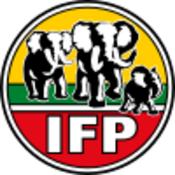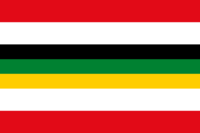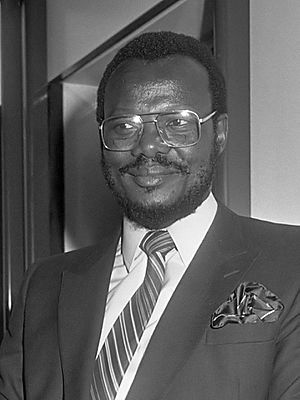Inkatha Freedom Party facts for kids
Quick facts for kids
Inkatha Freedom Party
IQembu leNkatha yeNkululeko
|
|
|---|---|
 |
|
| Abbreviation | IFP |
| President | Velenkosini Hlabisa |
| Chairperson | MB Gwala |
| Secretary-General | Siphosethu Ngcobo |
| Spokesperson | Mkhuleko Hlengwa |
| Deputy President | Inkosi Buthelezi |
| Deputy Secretary-General | Albert Mncwango |
| Treasurer-General | Narend Singh |
| Deputy Chairperson | Thembeni Madlopha-Mthethwa |
| Parliamentary leader | Velenkosini Hlabisa |
| Founder | Mangosuthu Buthelezi |
| Founded | 21 March 1975 |
| Headquarters | 2 Durban Club Place Durban KwaZulu-Natal |
| Student wing | South African Democratic Students Movement |
| Ideology |
|
| Political position | Right-wing |
| National affiliation | Multi-Party Charter (MPC) |
| Continental affiliation | Democrat Union of Africa |
| International affiliation | International Democracy Union |
| Colours | Red |
| National Assembly seats |
17 / 400
|
| NCOP seats |
2 / 90
|
| Provincial Legislatures |
16 / 487
|
| Party flag | |
 |
|
The Inkatha Freedom Party (IFP) is a political party in South Africa. Its name in isiZulu is IQembu leNkatha yeNkululeko. The IFP is known for its conservative ideas. It is currently part of South Africa's government, working with the African National Congress (ANC).
The party was started in 1975 by Mangosuthu Buthelezi. He led the party for a very long time, until 2019. Velenkosini Hlabisa became the new party president in 2019. The IFP gets most of its support from the KwaZulu-Natal province.
After the end of Apartheid in 1994, the IFP mostly had support from people of Zulu background. Since then, the party has tried to get more support across the country. They do this by promoting ideas that are socially and economically conservative. In the 2019 national election, the IFP came in fourth place. They won 3.38% of the votes and 14 seats in the National Assembly.
In the 2024 national election, the IFP won 17 seats with 3.85% of the votes. In June 2024, the IFP agreed to join the ANC-led Government of National Unity (GNU). The leader of the IFP, Velenkosini Hlabisa, became a government minister. He is now the Minister of Cooperative Governance and Traditional Affairs.
What the IFP Believes In
The IFP has several key ideas and policies:
- They want to give more power to provincial governments. This means provinces would have more control over their own affairs.
- They believe the head of state (like a president) and the head of government should be different people. One would be a ceremonial leader, and the other would run the country.
- They support a special voting system for the National Assembly.
- They want to make trade easier and reduce income taxes.
- They also want to make labour laws less strict.
- The IFP supports traditional African communities and their leaders. They believe these leaders should help with local government.
- They do not think that being part of a "tribe" is a bad thing or stops progress.
- The party has called for stronger laws against serious crimes in South Africa.
The IFP sees itself as a party that balances different ideas. They say they are not too socialist (where the government controls everything) and not too liberal (where there are very few rules). The party's values are based on Ubuntu/Botho, which are traditional African values about kindness and humanity. They want a future where all groups in South Africa have equal rights. They also support strong law and order. They especially want harsher punishments for people who commit violence against women and children. The IFP supports the Zulu monarchy and wants the Zulu King to have more power and recognition in the KwaZulu-Natal region.
History of the IFP

The Inkatha Freedom Party started as the Inkatha National Cultural Liberation Movement (INCLM). Mangosuthu Buthelezi founded it on March 21, 1975. He had been a member of the ANC Youth League before this. In 1994, the name was changed to the Inkatha Freedom Party (IFP).
Buthelezi used ideas from an older Zulu cultural group called Inkatha. This word means "crown" in Zulu. This older group was started in the 1920s by his uncle, Zulu King Solomon kaDinuzulu. The party began in what is now KwaZulu-Natal. Soon, branches of the party opened in other parts of South Africa.
During Apartheid
At first, the Inkatha movement and the African National Congress (ANC) were close. They both worked against the Apartheid system. However, by the early 1980s, they started to disagree. The ANC became much stronger through the United Democratic Front (UDF).
Even though Inkatha leaders first wanted peaceful change, there was fighting between Inkatha and ANC members in the early 1990s. Both sides formed their own protection groups. Buthelezi was a leader in a "Homeland" (a separate area for black South Africans during Apartheid). His power depended on the South African government. Many people saw him as working with the Apartheid government. They also criticized him for focusing on Zulu interests instead of national unity. This led to a kind of civil war between Zulu supporters of Inkatha and ANC members in KwaZulu-Natal.
Inkatha and the ANC also disagreed on international sanctions against South Africa. Sanctions were economic penalties meant to pressure the Apartheid government. Buthelezi argued that these sanctions hurt black South African workers. He even met with US President Ronald Reagan in 1984 to discuss this.
Buthelezi also worked with the South African Defence Force (SADF). Inkatha members were involved in some violent events before South Africa's first democratic elections. In November 1993, the IFP signed an agreement with the Afrikaner Weerstandsbeweging, a white right-wing group.
Before the first free elections in 1994, there was often violence between Inkatha and the ANC. Both parties tried to campaign in areas where the other party was strong, and this sometimes led to clashes. The IFP also disagreed with parts of the new South African constitution. They wanted an independent Zulu king as the head of state in KwaZulu.
Because of their disagreements, Inkatha first refused to register for the 1994 election. But when it became clear the election would happen, they registered at the last minute as the Inkatha Freedom Party. Some changes were made to the constitution to address their concerns. For example, KwaZulu-Natal was given more power, and the name 'KwaZulu' was added to the province's official name. On election day, the IFP showed its strength by winning most of the votes in KwaZulu-Natal.
After Apartheid
After Apartheid ended in 1994, the IFP formed a government with the ANC. This was a difficult partnership, but it lasted until 2004. After that, the IFP became an opposition party. The rivalry between the ANC and IFP continued, sometimes with political violence.
The IFP's goals include solving problems like the AIDS crisis, unemployment, crime, poverty, and corruption. They also want to prevent one party from becoming too powerful.
Challenges and Changes
After 1994, the IFP's support slowly decreased. They lost control of the KwaZulu-Natal province to the ANC in the 2004 election. Some important members left the party to form new ones. For example, Ziba Jiyane started the National Democratic Convention (Nadeco).
After the 2009 elections, party members started talking about changing leaders. Buthelezi had said he would retire but then changed his mind. Another senior IFP politician, Zanele kaMagwaza-Msibi, wanted Buthelezi to step down. She later left the party and formed the National Freedom Party (NFP). The NFP took many votes from the IFP, especially in KwaZulu-Natal.
In the 2014 general elections, the IFP had its lowest support since 1994. They lost their position as the main opposition party in the KwaZulu-Natal Legislature to the Democratic Alliance. Buthelezi later suggested that the IFP lost support because the ANC president, Jacob Zuma, was also from the Zulu people. He thought voters left the IFP based on ethnic ties.
Growing Again and New Leadership
In the 2016 local elections, the IFP's support grew for the first time since 1994. They gained back support in Northern KwaZulu-Natal. This was partly because the NFP could not take part in that election. The IFP also kept control of the Nkandla Local Municipality, where former ANC president Jacob Zuma lives.
In October 2017, Buthelezi announced he would step down as leader in 2019. The party chose Velenkosini Hlabisa to take over. In the May 2019 general elections, the IFP's support grew again. They became the official opposition in KwaZulu-Natal once more. Hlabisa was elected president of the IFP in August 2019.
Return to Power in KwaZulu-Natal
In 2024, the IFP formed a coalition government in KwaZulu-Natal with the ANC, the DA, and the NFP. This meant the IFP's candidate, Thami Ntuli, became the Premier of KwaZulu-Natal for the first time since 2004. Ntuli's election was seen as a setback for Jacob Zuma, who had left the ANC to lead the uMkhonto weSizwe (MK) party. Ntuli won against the MK party's candidate and took office on June 18, 2024.
Election Results
National Assembly Elections
| Election | Total votes | Share of vote | Seats | +/– | Government |
|---|---|---|---|---|---|
| 1994 | 2,058,294 | 10.54% |
43 / 400
|
– | Government of National Unity |
| 1999 | 1,371,477 | 8.58% |
34 / 400
|
First Cabinet of Thabo Mbeki | |
| 2004 | 1,088,664 | 6.97% |
28 / 400
|
in opposition | |
| 2009 | 804,260 | 4.55% |
18 / 400
|
in opposition | |
| 2014 | 441,854 | 2.40% |
10 / 400
|
in opposition | |
| 2019 | 588,839 | 3.38% |
14 / 400
|
in opposition | |
| 2024 | 618,207 | 3.85% |
17 / 400
|
Third Cabinet of Cyril Ramaphosa |
National Council of Provinces Elections
| Election | Total # of seats won |
+/– | Government |
|---|---|---|---|
| 1994 |
5 / 90
|
– | Government of National Unity |
| 1999 |
4 / 90
|
First Cabinet of Thabo Mbeki | |
| 2004 |
5 / 90
|
in opposition | |
| 2009 |
2 / 90
|
in opposition | |
| 2014 |
1 / 90
|
in opposition | |
| 2019 |
2 / 90
|
in opposition | |
| 2024 |
2 / 90
|
Third Cabinet of Cyril Ramaphosa |
Provincial Elections
| Election | Eastern Cape | Free State | Gauteng | KwaZulu-Natal | Limpopo | Mpumalanga | North-West | Northern Cape | Western Cape | |||||||||
|---|---|---|---|---|---|---|---|---|---|---|---|---|---|---|---|---|---|---|
| % | Seats | % | Seats | % | Seats | % | Seats | % | Seats | % | Seats | % | Seats | % | Seats | % | Seats | |
| 1994 | 0.17% | 0/56 | 0.51% | 0/30 | 3.66% | 3/86 | 50.32% | 41/81 | 0.12% | 0/40 | 1.52% | 0/30 | 0.38% | 0/30 | 0.42% | 0/30 | 0.35% | 0/42 |
| 1999 | 0.33% | 0/63 | 0.47% | 0/30 | 3.51% | 3/73 | 41.90% | 34/80 | 0.34% | 0/49 | 1.41% | 0/30 | 0.52% | 0/33 | 0.53% | 0/30 | 0.18% | 0/42 |
| 2004 | 0.20% | 0/63 | 0.35% | 0/30 | 2.51% | 2/73 | 36.82% | 30/80 | N/A | N/A | 0.96% | 0/30 | 0.25% | 0/33 | 0.24% | 0/30 | 0.14% | 0/42 |
| 2009 | 0.10% | 0/63 | 0.22% | 0/30 | 1.49% | 1/73 | 22.40% | 18/80 | 0.06% | 0/49 | 0.50% | 0/30 | 0.15% | 0/33 | 0.19% | 0/30 | 0.06% | 0/42 |
| 2014 | 0.06% | 0/63 | 0.11% | 0/30 | 0.78% | 1/73 | 10.86% | 9/80 | 0.08% | 0/49 | 0.26% | 0/30 | 0.14% | 0/33 | 0.06% | 0/30 | 0.05% | 0/42 |
| 2019 | 0.05% | 0/63 | 0.08% | 0/30 | 0.89% | 1/73 | 16.34% | 13/80 | 0.05% | 0/49 | 0.31% | 0/30 | 0.08% | 0/33 | 0.03% | 0/42 | ||
| 2024 | 0.07% | 0/73 | 0.19% | 0/30 | 0.87% | 1/80 | 18.07% | 15/80 | 0.06% | 0/64 | 0.47% | 0/51 | 0.15% | 0/38 | 0.08% | 0/30 | 0.04% | 0/42 |
KwaZulu-Natal Provincial Elections
| Election | Total Votes | Share of vote | Seats | +/– | Provincial Government |
|---|---|---|---|---|---|
| 1994 | 1,844,070 | 50.32 |
41 / 81
|
– | Majority government |
| 1999 | 1,241,522 | 41.90 |
34 / 80
|
IFP minority government | |
| 2004 | 1,009,267 | 36.82 |
30 / 80
|
ANC–IFP coalition government | |
| 2009 | 780,027 | 22.40 |
18 / 80
|
official opposition | |
| 2014 | 416,496 | 10.86 |
9 / 80
|
in opposition | |
| 2019 | 588,046 | 16.34 |
13 / 80
|
official opposition | |
| 2024 | 633,771 | 18.07 |
15 / 80
|
IFP–ANC–DA–NFP coalition government |
Municipal Elections
| Election | Votes | % |
|---|---|---|
| 1995–96 | 757,704 | 8.7% |
| 2000 | 9.1% | |
| 2006 | 2,120,142 | 8.1% |
| 2011 | 954,021 | 3.6% |
| 2016 | 1,823,382 | 4.7% |
| 2021 | 1,916,170 | 6.3% |
Images for kids
See also
 In Spanish: Inkatha para niños
In Spanish: Inkatha para niños


